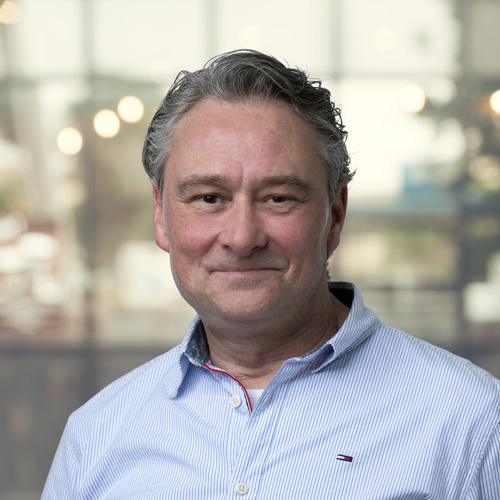
Paul Verschoor

‘People who have technology in their DNA and like to see their concepts and designs realised in an instrument or application”. Paul Verschoor is a TNO recruiter for the Industry unit, recruiting a wide range of technologists – from physicists to instrument makers. He tries to fit them all into multidisciplinary teams working on exciting new applications, especially for industry.’
‘As for the TNO story, I tell candidates that we were founded in 1932 by the Dutch government to put science at the service of society. We have a no profit motive and just about every field of technological application can be found in our six units. But that doesn't make us a ministry of technology, on the contrary. And certainly not our High Tech Industry unit, which is mainly focused on commercial applications.
Here we work on optics, optomechatronics and nano instrumentation, with applications for the semiconductor and space industries. Of course, now and then we do some pioneering, for example in the field of quantum and nanotechnology. But usually these involve innovative solutions that need to be quickly transferred to the real world. They are all conceived and developed by the people I recruit: physicists, mechanical and electrical engineers, and instrument makers.
Able to learn more
I'm absolutely fascinated by the work we do here. After my vocational technical studies in Electronics, I went on to complete a bachelor’s in Electrical Engineering, combined it with Commercial Economics. I am not only fascinated by the subject matter; my background also allows me to assess which talents we need.
Nevertheless, I always check an applicant’s qualities together with my technical colleagues. They look at whether you already have the knowledge or are able to acquire it. They also check whether you have the right passion for the work. Together with the research manager, I look at your attitude, behaviour and competencies.
At TNO we work in multidisciplinary teams: a physicist comes up with an idea, a mechanical engineer and a software developer work it out and the instrument maker fabricates it. That means you can't just sit in your corner all the time and raise the alarm if you can't come up with the answer. Never think, ‘Hey, I'm smart enough.’
Broader profile
Already 83 years ago the idea of applying technology and innovating for the wellbeing of the Netherlands was a good one. And I still think it is today. TNO's positioning between academia and industry remains unique. Our unit fits people who can tackle projects in parallel, have technology in their DNA, and like to see their concepts and designs realised in an instrument or application. To do this, you must have intelligence and domain knowledge, but also be communicative.
The ideal TNO person for me is someone who can commit to us and we can keep inspired for a long time. Up to the highest scientific level. However, there are also other ways to develop, for example in the direction of management or sales. We offer those opportunities. Of course, you commit yourself to the job to which you have applied for a couple of years, but through contact with your colleagues your interest may shift to another area. In fact, when assessing you we always check not only whether you are suitable for this vacancy, but also whether you fit a broader profile.
You always have your hand
How do I know I've caught a good one? That's often a gut feeling. If our communication goes well, our conversation has generated positive surprises, you come across as authentic… Still, I always sleep at least one night on it. And I check whether my experience matches that of my colleagues and the team manager.
A nice tip I give candidates to structure their competencies is The Hand. You go from thumb to little finger and ask yourself: what are you good at? Which direction do you want to take? What things do you dislike? Where do your loyalties lie? What makes you vulnerable? And then you grab the whole hand: what's your role in a team? Very easy, because you always have your hand with you!
And yet... I now have over twenty-five years of experience in high-tech recruitment, but these questions often remain surprising for technologists. The other day at a trade fair, someone came back specially to thank me for it. ‘Very nice,’ he said, ‘I'd never thought about it like that!
So why not ask these questions in advance to those around you: what do your parents and friends say about you? You'll be better prepared for that interview!’